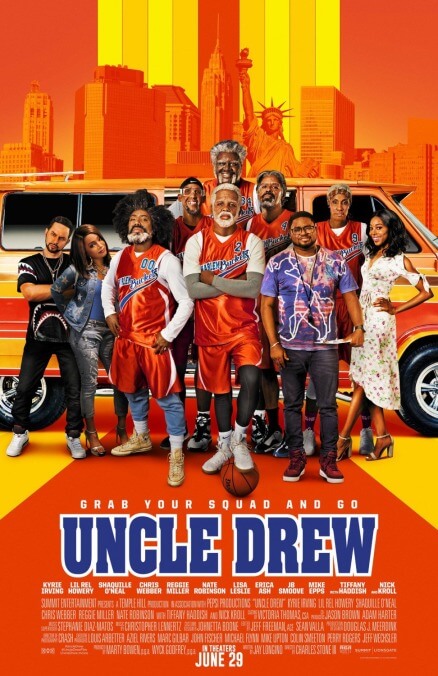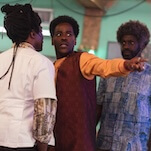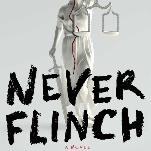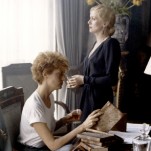To their extremely modest credit, all involved do seem to realize that this spry coot is too flimsy a character to anchor a movie. And so after an inspired 30 For 30 parody that lays out the ’60s glory days of its eponymous hero—a sequence much zanier, in a Lonely Island kind of way, than everything that follows—Uncle Drew introduces its true protagonist: down-on-his-luck, amateur basketball coach Dax (Lil Rel Howery), who’s sunken his life savings into a tournament at the famous Rucker Park, the real-life outdoor court where Irving, among many other NBA stars, got his start. Dax, of course, is a perennial underdog (every studio comedy, it seems, needs a zero to make into a hero), and after losing his team and his girlfriend to a rival, he finds himself turning to an unlikely recruit: the seventysomething Uncle Drew, who can still handle the ball like a champ, when not bitching about “hippity-hoppity” and kids today.
Drew’s one demand is that he assemble his own team. And so the two pile into his colorful, hippie-era love mobile to track down some old teammates, all played by veterans of the game: Preacher (Chris Webber), now a kooky pastor whose wife, Betty Lou (retired WNBA star Lisa Leslie), doesn’t approve of him lacing up again; the nearly blind Lights (Reggie Miller); Boots (Nate Robinson), who now uses a wheelchair to get around; and towering karate instructor Big Fella (Shaquille O’Neal), still nursing an ancient grudge against Drew. The players turned actors are actually all pretty good, performing broad shtick behind mounds of prosthetics. But there’s not a memorable personality among the five characters, and Uncle Drew leans heavily on the supposed hilarity of a bunch of superstar athletes playing seemingly decrepit old dodgers, as if that were joke enough. (The film, like its commercial predecessors, ends with footage of the players sitting still for the extensive makeup process.)
Shot a bit like a commercial itself, so crisp and flat that it seems designed to look best on a bar TV with the motion-smoothing turned on, Uncle Drew strings together the standard sports-movie clichés about believing in yourself, trusting your team, etc. In so much as its eponymous character has been deepened at all in his leap from small to big screen, it’s mostly through his transformation into a sagely platitude dispenser—“You miss 100 percent of the shots you don’t take,” he tells Dax, without a hint of irony. Sappier than it ever is funny, the film devotes a surprising amount of screentime to Drew’s decades-long feud with Big Fella, affording Shaq a few genuine notes of melancholy to play, before baring his giant ass for a punch-line. Meanwhile, director Charles Stone III (Drumline) stages the games only in montage—a choice that tends to rob them of any dramatic stakes, but does deliver on the promise of a bunch of pro basketball players showboating in old-man drag. Maybe the only demographic being targeted here is indiscriminate basketball fans, who will nod in recognition at the numerous cameos and get all the inside jokes, like a crack about Big Fella’s free-throw game and some gentle ribbing of Webber’s Preacher about remaining timeouts. (Howery, mugging relentlessly, gets his own version of these meta winks with a shout-out to Get Out.)
Look, for a movie based on a soda campaign, Uncle Drew isn’t that bad. It’s got some solid comic alternates, with Nick Kroll doing blustery, bug-eyed patter—and punching up scenes with funny ADR throwaways—as the aforementioned villain, while Tiffany Haddish scores some laughs in the thankless role of Dax’s naysaying, gold-digging ex. And while there is some product placement (much of it for Nike, oddly), it counts as some kind of restraint that no one in the squad ever cracks open and guzzles a Pepsi in close-up. As movies based on commercials starring basketball players go, it’s a sweeter, less soulless fiasco than Space Jam. But take away the crowd of punk’d onlookers bamboozled by Irving’s disguise—the whole hook of the commercials, really—and the sad truth is that Drew himself just isn’t a very funny character. In the end, he’s no more worthy than The Ladies Man or Mary Katherine Gallagher of his own starring vehicle. Only those who find the idea of slam-dunking geriatrics deeply, inherently hilarious will be able to resist dunking on Uncle Drew.








































